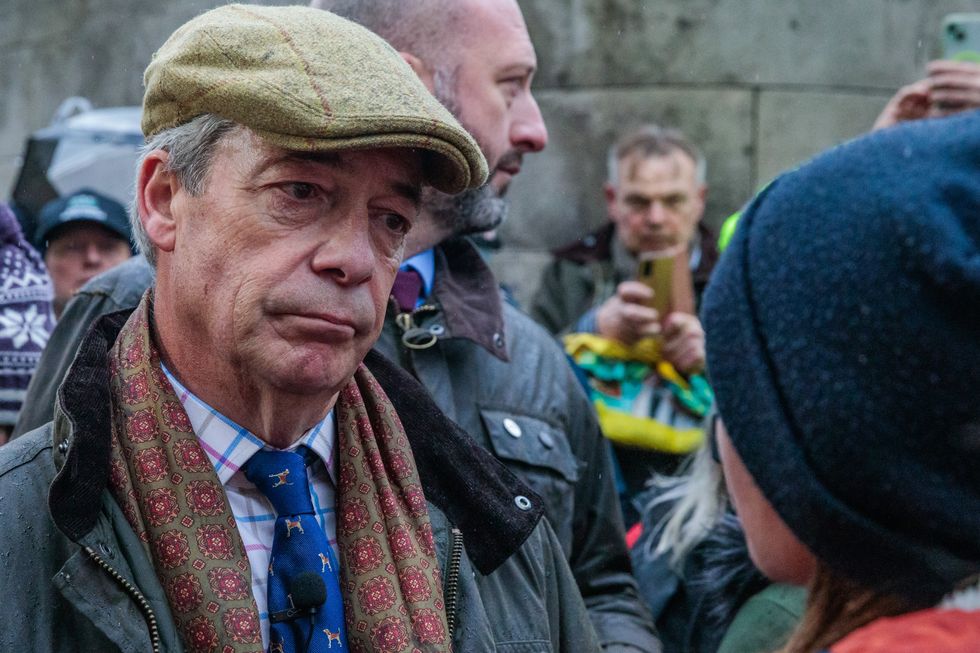Reform UK leader Nigel Farage has urged farmers to take the “rural revolt” against Rachel Reeves’ inheritance tax hike to Labour-held seats.
Farage, who joined tens of thousands of farmers and rural folk protesting in central London yesterday, issued the plea after Sir Keir Starmer doubled-down on ending death duty exemptions for farmers.
Speaking on GB News last night, the Brexit supremo said: “Labour now have somewhere between 70 and 100 seats they won at the election in rural or semi-rural constituencies.
“And I think what this movement now needs to do is not just to get together in London, but to be seen in market towns all over this country, especially ones that Labour won by very narrow margins at the next general election.”
The Country Land and Business Association believe Labour hold 114 rural seats.
While large London protests like the one seen yesterday hold powerful symbolic value, little actual pressure is applied to the government, something Farage knows hence why he has called for further action.
Ed Balls, former Labour Cabinet member, contributed to this debate recently when he revealed how farmers may need to be stronger with their action to be heard.
Speaking on his podcast Political Currency, Balls revealed the Countryside Marches- the last large rural protest in London- ‘didn’t ever cause the government difficulty’.
But Balls highlighted how the fuel disputes in 2002- which saw farmers blockade oil refineries and disrupt the supply chain of fuel to the point supermarkets began rationing food – had much more of an impact on the government.

Farage attending the farmers’ demo
Getty
A more important point to consider in the debate over forcing the government to act is one that former Tory Chancellor George Osborne highlighted.
Osborne revealed that governments tend only to respond to opposition to a new budget measure when it begins to damage their chances of passing the Finance Bill (budget) in a parliamentary vote.
So even with the massive pushback on farmers’ inheritance tax, it is unlikely Labour will feel much pressure given their current majority of 156.
However, with 114 MPs elected in rural and semi-rural seats, Starmer may still have a massive rebellion on his hands when the Finance Bill makes its way through parliament.
Obviously, he will be desperate to avoid such an embarrassing event, particularly while his popularity ratings remain at rock bottom.
GB News has analysed constituencies around the country and generated the ten rural constituencies that if further protests were held would apply maximum pressure on the government.
LATEST FROM MEMBERSHIP:
- ‘Played right into Putin!’ RAF chief reveals West’s FATAL error at start of Ukraine war as WW3 fears explode
- Labour targeting farmers is a class war – Starmer and chums just hate perceived wealth – Kelvin MacKenzie
- The stats that PROVE Nigel Farage is RIGHT: ‘Treasury got their sums wrong’ on farmers’ tax
North West Cambridgeshire
In at number two is North West Cambridgeshire where Sam Carling, a 22-year-old, was elected as Labour MP with a majority of 39. The ‘baby of the house’ will be hoping to avoid protests in his seat.
South West Norfolk
Third on the list is Liz Truss’ former constituency of South West Norfolk. Terry Jermy won the rural seat with a razor thin majority of 630.
North Somerset
Sadik Al-Hassan won this rural seat from Tory Liam Fox, former Defence Secretary, by just 639 votes. With many farms worth over the £1million IHT cap, Al-Hassan will be nervous about voting for a measure that hurts so many of his constituents.
Stirling and Strathallan
Fifth on the list of constituencies where rural protests would apply the most pressure goes to Stirling and Strathallan in Scotland. Labour MP Chris Kane won it from the SNP’s Alyn Smith with a small majority of 1,394.
Mid and South Pembrokeshire
We travel to Wales for sixth place on the list where Labour man Henry Tufnell defeated former Welsh Secretary Stephen Crabb by 1,878 votes. With a recent poll finding Reform to be the biggest party in Wales, protests here could apply serious pressure on Tufnell to vote against the Finance Bill, or face the ire of his farmer constituents.
South East Cornwall
Another rural seat in Britain’s far southwest, Anna Gelderd won South East Cornwall by a small 1,911 votes.
South Norfolk
The second Norfolk constituency to make this list is South Norfolk. Revolts here could persuade Labour MP Ben Goldsborough, who defeated Tory Poppy Simister-Thomas by 2,826 votes, to vote against the government on the farming tax.
Banbury
Labour MP Sean Woodcock defeated former Tory cabinet minister Victoria Prentis by 3,256 votes in this rural seat in the heart of Britain.
Monmouthshire
Last but not least is Monmouthshire in South East Wales. With many farms worth over the new £1million threshold for inheritance tax, it will be difficult for Labour MP Catherine Fookes- who defeated former Welsh Secretary David TC Davies by 3,338 votes- to not respond to protests in her patch.
Three Labour MPs – Terry Jermy, Andy MacNae and Steve Witherden – are seemingly already feeling the heat from constituents and have called for more Treasury transparency over the inheritance tax grab.
Analysis has also shown that Labour could lose up to 59 seats over the farming row as dozens were identified as either rural or semi-rural.
Farmers appear inclined to listen to Farage’s advice. In a warning to Starmer, Farming Forum founder Clive Bailye said: “They need to know this is just a warm up act.”